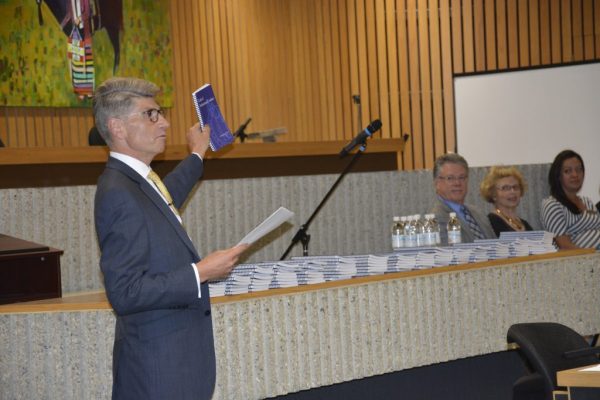
Orientation Week: Robson Hall Welcomes Law Class of 2020 with Focus on Integrity, Professionalism, and Awareness of Indigenous Legal Traditions
Dean of Law, Jonathan Black-Branch warmly welcomed Robson Hall’s new group of future lawyers with friendly greetings, encouragement for success and tips for making the school proud during the Faculty of Law’s Orientation week, which ran from September 5 to 8. Highlights included a Welcome address from the Chief Justice of Manitoba, a Blanket Ceremony and talk from Loretta Ross, the Treaty Commissioner of Manitoba, to raise awareness of Indigenous legal traditions, and a visit to the Canadian Museum for Human Rights.
At the annual Welcome Ceremony September 5, The Honourable Mr. Justice Richard Chartier, Chief Justice of Manitoba, presented all first year law students with personalized copies of the Manitoba Law Society’s Code of Professional Conduct. Melissa Beaumont, President, and Stacy Nagle, Executive Director of the Manitoba Bar Association and Kristin Dangerfield, C.E.O. of the Manitoba Law Society attended this Robson Hall tradition.

Dean of Law, Dr. Jonathan Black-Branch addresses First Year Law students on the importance of professionalism.
Dean Black-Branch’s opening remarks included a few words on professionalism. “Your reputation is difficult to gain and easy to lose,” he cautioned, adding that today’s ‘iGeneration’ faces new challenges with the need to maintain one’s online professional reputation and to be taken seriously in advancing justice. “Good character is at the heart of being a lawyer,” he said.
Susan Gottheil, Vice-Provost (Students) at the University of Manitoba continued the Dean’s message, saying “You are representing your profession, the University of Manitoba, and the Class of 2020.” She encouraged students to “support each other, get enough sleep, good food, and take care of yourselves.”

The Honourable Mr. Chief Justice Richard Chartier addresses first year law students on the first day of classes.
On a more cautionary note, Chief Justice Chartier shared a story of an American Judge who warned law students to learn about failure, pain, and disappointment in order to build strength and resilience. He drew attention to the failure of a recently reported list of top five qualities of lawyers to include integrity. “Integrity is doing what’s right, regardless of who is watching,” he said, emphasising that the first rule in the Code of Conduct is Integrity, the number one fundamental quality of any person of the legal profession. “Your integrity is what determines your reputation,” he said, quoting the old saying, “But by your words and actions shall ye be known.”
The Chief Justice left the students with four tips on Integrity: 1. Win fairly and honourably; 2. Choose your associates carefully (avoid associating with those who lack integrity); 3. Remember that perception determines reality; and 4. Don’t do unto others what you don’t want done unto you.
Awareness of Indigenous Legal Traditions
Over the past year, many aspects of Robson Hall have been changing to incorporate the acknowledgement, awareness, and presence of Indigenous people into the process of educating future lawyers. A Blanket Ceremony held September 6 during Orientation week served to raise awareness of the history and context of Indigenous people within Canada’s legal system.
Hosted by Chuck Wright, Rebaz K. Mohammed and Kathy Moorhead Thiessen of the Christian Peacemaker Teams (CPT) Indigenous Peoples Solidarity Project, the Blanket Ceremony involved students standing together on blankets representing Turtle Island (North America), the lands granted to the First Nations people by the Creator, each nation having their own laws and customs that were ultimately taken away by European colonizers. Each student was called upon to read an assigned quote from historical figures including Chief Big Bear, George Erasmus and Senator Murray Sinclair. As the story-telling progressed from the 14th century to modern times, students were asked to leave the circle and blankets were removed, illustrating the loss of lives, rights and land of Indigenous people. Legal concepts ranged from the 15th Century Doctrine of Discovery to the unilateral introduction of the Indian Act to the rise of Residential Schools, ending with the continuing discrimination perpetuated by child protection policies. The ceremony ended with students being invited to sit in a sharing circle to share questions, comments and reactions.
Students later attended a talk by Loretta Ross, Treaty Commissioner of Manitoba, notably the first female Treaty Commissioner, daughter of University of Manitoba’s Elder in Residence, Norman Meade, and granddaughter of the late George Barker, former Chief of Hollow Water First Nation.
Ross first explained the role of the Treaty Commission and shared some personal stories about growing up on the Hollow Water reserve. Public awareness and Treaty education is one of her primary roles, teaching both students and teachers about Treaties. The Commission also does research, examining the written text of treaties and putting it in context with traditional oral histories of the First Nations People, which have now been recognized by the Supreme Court of Canada. The Treaty Commissioner also serves as a facilitator, working with governments and organizations to make treaties relevant today.
To illustrate that Treaties affect all Canadians, Ross recalled her grandfather’s words to her when she left home to go to University: “When you go you take us with you,” which left her feeling like she carried a big responsibility. “We are all treaty people” was another important message she took with her, which includes all Canadians including newcomers.
Ross concluded by encouraging students to challenge the law, making the distinction that Indigenous Law is NOT Canadian Law as it applies to Indigenous people, but rather Indigenous people have their own legal systems. “Everybody looks to lawyers to fix things and make changes,” she said, “and that’s you.”








